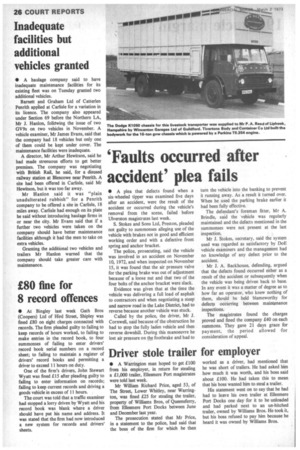'Faults occurred after
Page 28

If you've noticed an error in this article please click here to report it so we can fix it.
accident' plea fails
• A plea that defects found when a six-wheeled tipper was examined five days after an accident. were the result of the accident or occurred during the vehicle's removal from the scene, failed before Ulverston magistrates last week.
S. Stokes and Sons Ltd, Preston, pleaded not guilty to summonses alleging use of the vehicle with brakes not in good and efficient working order and with a defective front spring and anchor bracket.
The police, prosecuting, said the vehicle was involved in an accident on November 10, 1972, and when inspected on November 15, it was found that the air pressure valve for the parking brake was out of adjustment because of a loose nut and that two of the four bolts of the anchor bracket were slack.
Evidence was given that at the time the vehicle was delivering a full load of asphalt to contractors and when negotiating a steep and narrow road in the Lake District, had to reverse because another vehicle was stuck.
Called by the police, the driver, Mr J. Cornwell, said because of the obstruction he had to stop the fully laden vehicle and then reverse downhill, During this manoeuvre he lost air pressure on the footbrake and had to turn the vehicle into the banking to prevent it running away. As a result it turned over. When he used the parking brake earlier it had been fully effective.
The defendant's foreman fitter, Mr A. Brindle, said the vehicle was regularly maintained and the defects mentioned in the summonses were not present at the last inspection.
Mr J. Stokes, secretary, said the system used was regarded as satisfactory by DoE vehicle examiners and the management had no knowledge of any defect prior to the accident.
Mr J. A. Backhouse, defending, argued that the defects found occurred either as a result of the accident or subsequently when the vehicle was being driven back to base. In any event it was a matter of degree as to how far an operator. who knew nothing of them, should be held blameworthy for defects occurring between maintenance inspections.
The magistrates found the charges proved and fined the company £40 on each summons. They gave 21 days grace for payment, the period allowed for consideration of appeal.




































































































